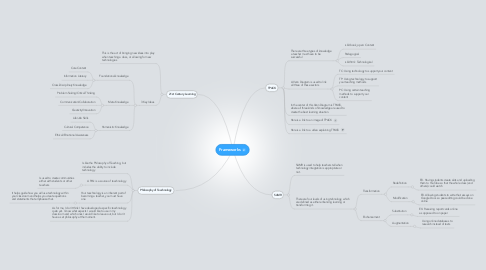
1. Philosophy of Teachnology
1.1. Is like the Philosophy of Teaching, but includes the ability to include technology
1.2. A PLN is a source of teachnology
1.2.1. Is used to create communities either with students or other teachers
1.3. Your teachnology is an inherent part of becoming a teacher, you must have one
1.3.1. It helps guide how you will use technology within your classroom and helps you create questions and statements that emphasize that.
1.4. As for me, I don't think I have developed a specific teachnology quite yet. I know what aspects I would like to use in my classroom and which ones I would like to leave out, but I don't have a set philosophy at the moment.
2. TPACK
2.1. There are three types of knowledge a teacher must have to be successful
2.1.1. Content
2.1.2. Pedagogical
2.1.3. Technological
2.2. A Venn Diagram is used to link all three of these sectors
2.2.1. TC: Using technology to support your content
2.2.2. TP: Using technology to support your teaching methods
2.2.3. PC: Using certain teaching methods to support your content
2.3. In the center of this Venn Diagram is TPACK, where all three kinds of knowledge are used to create the best learning situation.
2.4. Here is a link to an image of TPACK
2.5. Here is a link to a video explaining TPACK
3. SAMR
3.1. SAMR is used to help teachers tell when technology integration is appropriate or not.
3.2. There are four levels of using tehnology, which are defined as either enhancing learning or transforming it.
3.2.1. Transformation
3.2.1.1. Redefinition
3.2.1.1.1. EX. Having students create skits and uploading them to YouTube so that the whole class (and others) could watch
3.2.1.2. Modification
3.2.1.2.1. EX. Allowing students to write their essays on Google Docs so peer-editing could be done online
3.2.2. Enchancement
3.2.2.1. Substitution
3.2.2.1.1. EX. Receiving report cards online as opposed to on paper
3.2.2.2. Augmentation
3.2.2.2.1. Using online databases to research instead of texts
4. 21st Century Learning
4.1. This is the act of bringing new ideas into play when teaching a class, or allowing for new technologies
4.2. 3 Key Ideas
4.2.1. Foundational knowledge
4.2.1.1. Core Content
4.2.1.2. Information Literacy
4.2.1.3. Cross-Disciplinary Knowledge
4.2.2. Meta Knowledge
4.2.2.1. Problem Solving/Critical Thinking
4.2.2.2. Communication/Collaboration
4.2.2.3. Creativity/Innovation
4.2.3. Humanistic Knowledge
4.2.3.1. Life/Job Skills
4.2.3.2. Cultural Competence
4.2.3.3. Ethical/Emotional Awareness
